Comments on Prothetic Dental Implants
Purpose
The purpose of writing this patient information monograph is to give you as much information as we can, and to present it as conveniently as possible.
Natural Teeth
Your own natural teeth present in your mouth in a healthy, well-maintained condition are the best natural dental implants which you can possibly have. There is nothing else which compares with them. It is, therefore, in the best interest of your health and well-being to do anything you can to keep your teeth in the best condition for the longest possible time. With good care on your part, and with good frequent dental check-ups, you will be able to accomplish this goal.
Supplementing Natural Teeth
When a tooth is lost, it is best to replace the tooth with a non-removable replacement as promptly as possible. With the replacement of a single tooth, a non-removable bridge is often very satisfactory. However, in replacing a number of missing teeth, and at the same time restoring the chewing efficiency, you have decreased the support which was present when the natural tooth was in the mouth. The artificial tooth of the bridge does not have a root. In reality, this is no great concern when dealing with a single tooth replacement. But assuming that we have lost two or three teeth in a row, or have lost several teeth spread out intermittently through the entire jaw, it quickly becomes obvious that a considerable amount of root support has been lost. Now, it does make a difference. In effect, we have increased the load on each remaining tooth because there are fewer of them. This can be compared with losing fence posts in a long fence. The fence is not any shorter, but there are fewer posts supporting the fence. The fence is not as strong now as it was earlier. In the case of the fence, it is obvious that the fence posts need to be added so that the amount of support will be increased, and similarly these areas in the mouth need to be aided by replacing the missing root structure by means of dental implants.
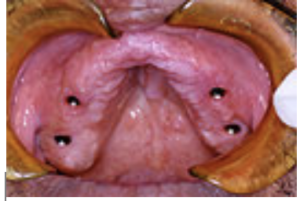 Artificial Root Artificial Root
|
Partial Dentures
Does a removable partial denture replace the missing teeth equally as well? Partial dentures are either tooth supported or tooth and gum supported. If it is entirely tooth supported, the space has been replaced or filled in, but the supporting teeth are no more than they were before. In other words, the load has been increased on the remaining teeth. In the case of a partial denture which is both teeth and gum supported, the number of teeth has not increased (there is still no more root support than there was before), the areas where teeth are missing have been filled in with gum-supported denture teeth. This means that the gum tissue and bone under these denture areas are not relined, then a space develops under the denture. It is not bearing its fair share of the chewing load, and the remaining teeth will undergo accelerated bone loss. Also, this partial denture is removable. It is not permanently fastened in the mouth as a non-removable bridge would be.
|
|
|
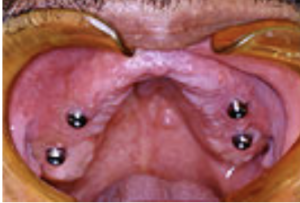 Healing Cap Healing Cap
|
Tooth Supporting Bone
Nature has provided tooth supporting bone during the years when there are teeth present in the mouth. When the teeth are lost, the tooth supporting bone is also lost. Nature takes away from you what you do not use. for example, the person who is confined to bed for a long period of time loses muscle tone. The muscles get soft and literally wither away. In the mouth, the bone under the gums “shrinks”, and dentures get loose. Notice in the mouth of a person who has half of his/her teeth, the bone is present around the teeth which remain. Where the teeth have been lost, many times it looks like the back of a “swaybacked” horse. Where implant prosthetics have been placed and properly maintained, the tendency is to preserve this bone because the bone is being used somewhat in the same way it was when the natural teeth were present.
|
|
|
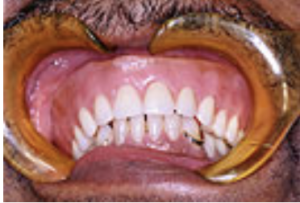 Fixtures placed onto the Dental Implant Fixtures placed onto the Dental Implant
|
Chewing Efficiency
For purposes of comparison let us assume that the patient with all his/her natural teeth in a healthy, well-maintained functionally accurate condition can operate with chewing at 100% efficiency that will decrease with every tooth lost. How much decrease there will be will depend on whether or not the teeth are replaced and in what manner.
Ultimately, if s/he reaches the point where s/he has no teeth at all, s/he may have (with good fitting dentures on adequate bony ridges) a chewing efficiency of perhaps 15-81%.
If the ridges are not adequate, the percentage decreases. With implants and non-removable bridge work or supported tooth replacement methods, s/he may get back as high as 85% compared with what s/he had with his/her natural teeth, depending on the number of natural teeth present and their condition.
|
|
Medical Examination
This is an absolute necessity. We will provide you with a “medical history verification” form to take to your physician. S/he will provide us with results of recent examination records including blood tests and urinalysis. S/he will make indications of drug allergies and/or alternative recommendations. S/he will want to make sure you are healthy and that there is no reason why you should not heal very nicely. We also want your medical doctor to be aware of the treatment we’ll be providing you and the medications we may prescribe.
Home Care
The dental care you provide yourself at home must be excellent. You must keep your teeth and implants cleaner than you may have done before in your life. You must be able to use dental floss, tooth brush, or other devices we may recommend to keep plaque off of both your teeth and implants. If this is not done, there is a very good possibility that these implants will not succeed, and will have to be removed. By the same token, smoking and excessive alcohol consumption are a deterrent to excellent dental health as well.
X-Rays
You must have a very complete examination with x-rays which will include a panoramic x-ray of your entire mouth. X-Rays are necessary for proper diagnosis and follow-up after treatment is complete.
Opposing Teeth
The teeth or denture which are in the arch opposite to the implanted area compose a very important consideration in the success of the implant. The load on the implant is not actually in use. There must not be any grinding (brusism) against the implant. Also, care must be taken not to overload the implant by chewing ice or hard objects which could damage even your natural teeth. The patient should not engage in fights or do anything else which could be damaging to the implant or the underlying bone.
|
|
|
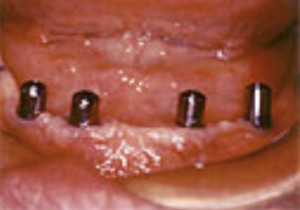 |
Loss of Nerve Sensation
There are cases reported in the dental literature in which there is temporary loss of nerve sensation following certain surgical procedures. This does happen sometimes, but is usually temporary. Unfortunately, there have been such occurrences following removal of deeply impacted wisdom teeth. It is possible that such a thing could happen with the placement of implants in the bone. It is usually temporary, and is a loss of nerve sensation only, and does not cause a drooping or sagging of the face.
|
|
|
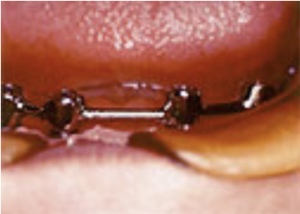 |
Are All Prothetic Dental Implants Successful?
No. There are many variables to be considered in placing implant prosthetics. First, the patient must be healthy. There must be adequate healing powers present in the patient. If the patient is an uncontrolled diabetic, for example, the chances for healing are not too good and could be quite a problem. If such a condition develops at a later date after the implant has been done, this will certainly complicate the future of the implant. Secondly, proper diagnosis must be made, and the proper implant must be selected for the patient and, of course, inserted properly. Thirdly, it must be treated properly by the patient and the dentist. If either person becomes forgetful, there could be a problem. Fourthly, if the patient is a heavy smoker or an excessive alcoholic beverage user, that certainly doesn’t help, and the success of the implant will be affected.
|
|
|
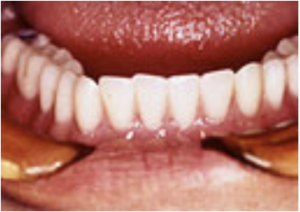 |
Will Implants Last A Lifetime?
It is doubtful. Very few things do last a lifetime. There are some implants which have been in the mouth for as long as thirty years. this is not the average. The average has been in less than that time. In the final analysis, whether they last a lifetime depends on how long you live. Every natural tooth in the mouth of everyone of us now living will have one of two possible fates. It will either last until we die, or it will be removed at some time. The same thing applies to prothetic dental implants.
|
|
|
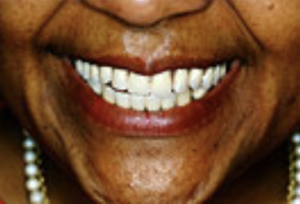 |
Is Age A Deterrent?
No. Health is a deterrent. Many people 70 and 80 years of age are better surgical risks than someone years younger who has everything physically wrong with him/her. Older people are more likely to need implants because they have lost more teeth, and have lost more ridge.
As long as you live and breathe and are important to someone, you owe it to yourself and family and friends to take the best care of yourself that you possibly can. Incidentally, what is good age for a heart or kidney transplant or a coronary by-pass? If you need such an operation to stay alive or improve the quality of your life, would you refuse because of age?
|
|
Rejection By The Body?
Implants are made of biologically compatible materials which have undergone extensive testing over a period of several years in research laboratories using animals. Since these materials are largely metal–titanium, vitallium, etc. – and have never been living tissue, there is no likelihood of causing an antigen-antibody response which could cause rejection similar to that which sometimes occurs with heart and kidney transplants.
Decisions
If you have decided that you want to be considered as an implant prosthetics candidate, and you feel that psychologically there will be no emotional problem for you to have prosthetic dental implants, then you can be encouraged from the fact that there are many people in this country and throughout the whole world who have hip transplants, pins placed into their hips, kidney and heart transplants, and cornea transplants with excellent results. If you do not feel that you have adequate emotional stability to undergo similar treatment, then I would advise you against having an implant.
Guarantee
There is no way that we can guarantee anything which goes into the mouth, and which is under the control of the patient. The physician does not tell you that the transplanted heart, the kidney transplant, or the coronary by-pass will keep you alive for any specified period of time. We can only tell you that we will endeavor to place the implant properly, will give you the information you need to care for your implant at home, and will be available for periodic check-up appointments to evaluate your continued dental health. We will do everything we can to make the implant succeed, but you will have to make the same commitment. If you do not hold up your end of the bargain, the implant will most likely fail. Also, you must return to our office at regular intervals, according to our recommendation for examination and service. If you do not do this, you could get into difficulty without your knowing it. This could result in a loss of the implant. Under such circumstances, the fault would be yours. Due to the complex nature of oral implantology, it is important that all post-operative examinations and/or treatment be held by this office. Referrals will be made only to those doctors with experience and training in implant dentistry.
Cosmetic Surgery
Are dental implants inserted for cosmetic purposes? Absolutely not. The primary objective of dental implants is to give additional support to the replacement teeth. Dental implantology is not a total substitute for face lift plastic surgery. Some cosmetic enhancement is possible, however, and those expectations should be fully discussed prior to treatment.
Further Questions
If you have any questions on implant prosthetics or dental implants which have not been fully answered by this monograph, please feel free to ask them prior to beginning treatment. We will do our best to inform you.
|






 Artificial Root
Artificial Root Healing Cap
Healing Cap Fixtures placed onto the Dental Implant
Fixtures placed onto the Dental Implant